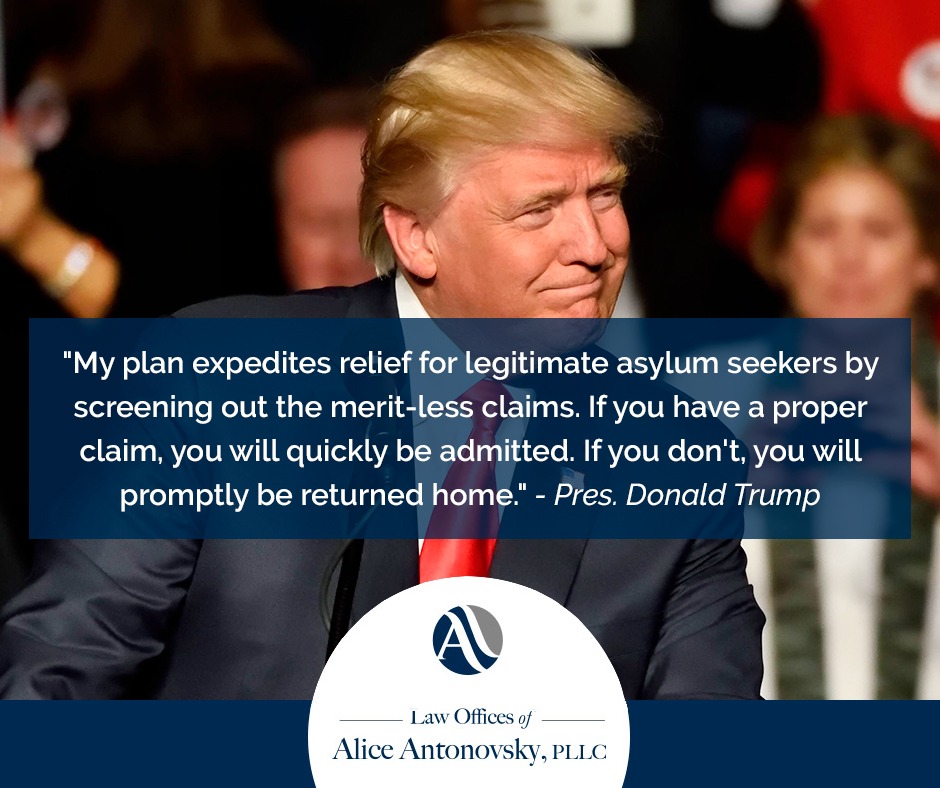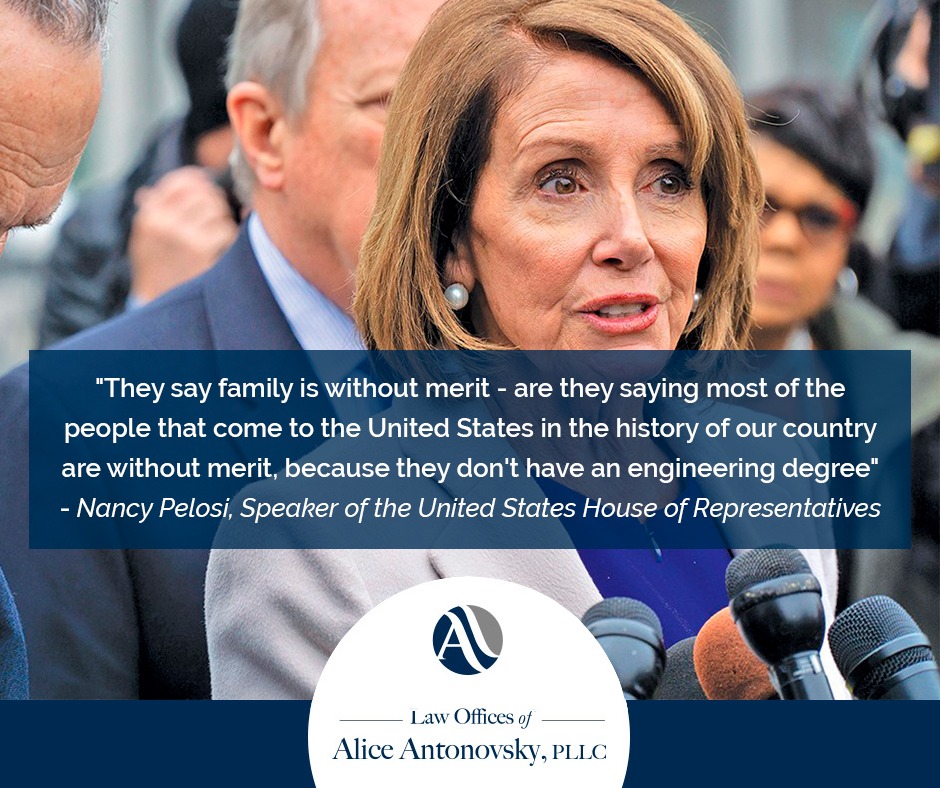Last month, President Donald Trump announced an immigration overhaul proposal which targets skilled workers according to The Wall Street Journal. In fact, since his election, President Trump has announced his support for a merit-based immigration system, a.k.a. points system, on numerous occasions. He mentioned it in his 2018 State of the Union speech and also in a 2017 speech to a joint session of Congress.
If passed, his proposal would dramatically change the United States immigration system, favoring highly-skilled workers over people seeking family reunification. It is a points system like those currently used in Australia and Canada.
What It Means
Before we get into the analysis, it’s vital to know exactly what it means. According to CNN, “merit-based immigration means using individuals’ skills to decide whether they should be allowed to immigrate.” The key idea behind this system would be to attract “the best and brightest all around the world,” said Trump.
Facing an uphill battle for consensus, Trump’s proposal wants to replace the longstanding family-based immigration policy with one favoring financially self-sufficient, highly-skilled immigrants. Trump said his policy would use “an easy-to-navigate, point-based selection system” in order to determine eligibility.

The Controversy
President Trump has long praised the immigration systems of both Canada and Australia, which are both merit-based systems. As mentioned earlier, this system prioritizes skilled immigrants via a system of points. According to Trump, replacing the American system with a point-based selection system would boost the wages of natives and immigrants, while providing huge savings to the taxpayer.
Proponents of a merit-based immigration system promote it as a technocratic approach to selecting immigrants which improves a country’s economy in a way that systems with no direct government involvement in the election of immigrants don’t. Nevertheless, opponents of a points-based selection system disagree. They believe it may hurt the economy. According to The Perspective, “A merit-based immigration system would not necessarily be better for America.”
Should the United States Adopt Such a System and Which Immigrants Benefit the Country?
- 1 million foreigners are granted green cards each year under the current U.S. immigration system. Legal permanent residence is obtained via a job offer from a U.S. employer, family sponsorship, humanitarian reasons and green-card lottery. According to the Migration Policy Institute, the majority of annual green cards are granted on the basis of family ties with residents, with only 14% granted on the basis of employment.
- Temporary visa holders also influence the economy. 1/2 of new permanent residents are people who are already in the country transitioning from temporary visa holders to lawful permanent residents (see graph). Few temporary visas go to relatives of residents unlike green cards. Most temporary visas issued in 2016 were for workers with a job offer (700,000 H & L visas); students (513,000 F & M visas) and exchange visitors, most of whom work (380,000 J visas). Some work-related temporary visas were granted to unskilled workers including agricultural H-2A visas (134,000).
- The U.S. government leverages the skill mix of immigrants via the visa categories, yet doesn’t select those entering within those visa categories. In fact, employers play a key role when it comes to the selection process for visa applicants. Each year, businesses can submit up to 85,000 applications for H-1B temporary work visas reserved for workers who have a master’s or doctoral degree. A lottery is used when there’s too many petitions. In 2016, 180,000 petitions were approved.
- The core of a point-based selection system is that the government comes up with a list of desirable attributes for immigrants, weighs them by assigning different numbers of points to each and selects a threshold number of points. The government then prioritizes prospective immigrants with points higher than the threshold. Australia and Canada have long been using some sort of points system favoring immigrants with more experience and education. “78% of U.S. adults support encouraging highly skilled people to immigrate and work in the U.S.,” as stated by Pew Research Center. Hence, a points system which favors skilled immigration may be viewed positively in America.
- No country admits immigrants solely based on the merit-based system. Along with immigrants admitted via the points system, Canada also accepts immigrants based on family ties or humanitarian reasons. The impact of a point-based system is determined by its scope as well as the criteria used for points. What if the U.S. were to introduce a points system? It may have more impact if applied to the green cards and temporary visas which are already employment-based as well as to the merit-based visas.
- One advantage of merit-based immigration is that it can choose immigrants who’ll earn more money, making substantial contributions to the government. Evidence shared by Emerald Insight demonstrates that immigrants admitted via the point-based system have higher education, earnings and employment rates than those admitted via other channels, and are more likely to make substantial net contributions to the government.
- But, there’s evidence that immigrants selected on the merit-based system perform less well in the job market than one may expect. According to ResearchGate, unlike college-educated immigrants in the U.S., college-educated immigrants in Canada earn high school level wages. Why? It’s possible that the role that employers play in choosing immigrants is a factor. Perhaps U.S. employers do a better job in choosing foreign workers. That’s why Canada and Australia amended their points system, recognizing that employer involvement is pivotal for choosing the most productive immigrants.
- The effect of immigrants on the host country’s economy is not just limited to the budgetary impact of immigration. The U.S. may also benefit from unskilled immigrants. The greatest advantages accrue to natives when the immigrants are very different from them, they become more competitive. Thus, the job market becomes more effective since workers increasingly specialize in the tasks they do best. In other words, both unskilled and skilled immigrants benefit the country.
- Nevertheless, not everyone in the host country’s economy gains. Research by the National Academies reported that even if U.S. immigration doesn’t affect standard wages of native Americans, it does cut wages of native high school dropouts. Even if there’s no direct evidence on how a points-based system impacts immigration, if the system favors highly-skilled immigrants, native high school dropouts may be reduced, at the cost of cutting the wages of skilled native Americans.

The Bottom Line
So, would the United States benefit for a merit-based immigration policy? It’s still not clear. As you can see, there are advantages and disadvantages to a points system favoring highly-skilled workers. It’s probable that the economic contribution of immigrants to the U.S. is much greater under an immigration system where employers play a key role, and it’s not clear on empirical or theoretical grounds that it’s best done via a point-based selection system.
The truth is that the country’s economy will gain most from immigration only if low-skilled immigrants are allowed entry, with or without a point-based selection system. On the other hand, this has less desirable effects than an immigration system focusing on skilled workers, which is less likely to have a negative impact on the salaries of unskilled native workers. That’s the bottom line.
If you want to evaluate your immigration case, request a confidential consultation with our team today!








